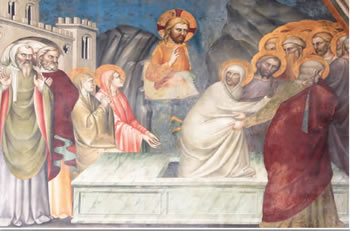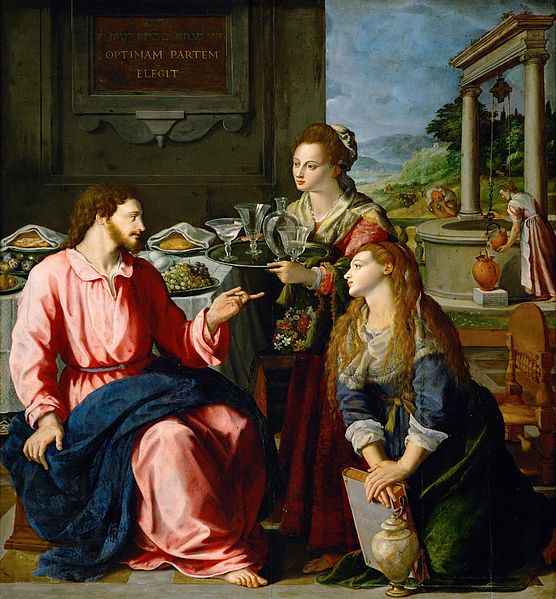It is easy to note how the daily tasks of modern humanity, such as the upkeep of the home, the education of children, study, work and even the desire to take full advantage of the rare moments available for rest and relaxation, has made life into a veritable marathon. Immersed in these activities, we often end up forgetting the most important things: the interior life, meditation, our relationship with God, with our Guardian Angels and with the supernatural world.
Regardless of the state of life to which we have been called, for both religious and laity, keeping in mind the higher things is a point that will always require vigilant attention.
“Mary has chosen the better part”
Contemplation, of itself, is more important than action. Our Lord made this very clear in the Gospel, when St. Martha asked Him to order her sister to help her, seeing that, while she toiled with the domestic chores, St. Mary Magdalene did not stir from the feet of the sublime Guest.
Having received the Redeemer into their home, they both had the duty to endeavour to serve Him in the best manner possible. And since Martha was the elder of the two sisters and was extremely accomplished, she personally strove to prepare a banquet worthy of the illustrious Invitee.
Commenting on this passage of the Gospel, Msgr. João Scognamiglio Clá Dias, EP explains: “According to prevailing etiquette, a visitor of eminence was served by the hosts.
[…] Yet Mary, enraptured with joy at the presence of the Lord, had completely forgotten her obligations as hostess, leaving the entire task to her sister.”1
Now, by asking Our Lord to send Mary from His presence to help her, Martha was giving more attention to the practical preparations than to the Person of the Redeemer. Thus, probably without realizing it, she was neglecting the First Commandment of the Decalogue, as Msgr. João points out further on:
“Although concerned with serving Our Lord in the best way possible, perhaps Martha’s intention was also to maintain the great prestige of the house. Thus, she was troubled, taken by concerns which were not entirely in harmony with love of God; for the family name was at stake. And when God is not in the centre of our considerations, agitation easily gains entry.”2
In response to the elder sister’s request, esus revealed one of the most beautiful and profound principles that humanity has ever heard: “Martha, Martha, you are anxious and troubled about many things; but one thing is necessary. Mary has chosen the better part, which shall not be taken away from her” (Lk 10:41-42).
In admonishing her for her agitation, the Divine Master invites Martha to abandon her pragmatic and naturalistic attitude, in which God did not hold the central place.
Action and contemplation are not mutually exclusive realities
What exactly is this “better part” that Mary had chosen?
There seems to be no doubt as to the response, or at least what is es sential in it: to be as close as possible to Jesus in any and all situations.
However, this does not justify that we abandon our obligations.
Action and contemplation are not mutually exclusive realities. As the main host, Martha was responsible for taking special care of the practical matters, but she needed to do so with her eyes fixed entirely on Jesus. And if Mary had acted under the impulse of perfect love, she would have “yielded to her elder sister’s decisions, fulfilling the obligations that fell to her, without losing her devotion, keeping her heart set on Our Lord.”3
In this sense, Dr. Plinio Corrêa de Oliveira explains that “man should have the interior life in the first place, and then the other things.” And “when he chooses to be a man of interior life before all else, he establishes the most important condition for being what he should be in other fields.”4
From this attitude follows the perfect union between action and contemplation. If we learn to recognize that the former necessarily flows from the latter, and takes its structure from it, our concrete duties will begin to have a relationship of direct dependence on our practices of piety.
The soul, being immortal, deserves to receive much more attention than material, and therefore, fleeting things.
“Seek ye first the Kingdom of God”
Knowing the weaknesses and disorders of human nature marked by original sin, Our Lord taught us to seek first the Kingdom of God and His righteousness, and all other things will be added unto us (cf. Mt 6:33).
This means setting up a throne in our souls for the Creator and yielding entirely to His sovereign dominion. Besides being a duty of every Christian, this conduct will bring us innumerable graces and gifts, for “the Lord will occupy Himself all the more with our interests when we concern ourselves with His interests.”5
“Let us keep all our faculties under the merciful sceptre of the Most High. Let our intelligence ever remember His constant presence; let our will be conformed in all things to His adorable will; let us lift up our hearts frequently to Him by acts of ardent and sincere charity. […] In this way we shall follow to the letter Our Lord’s counsel: we shall seek the Kingdom.”6
This is the counsel that a sagacious spiritual writer, Fr. Thomas de Saint-Laurent, gives us in his famous Book of Confidence. Acting thus, we will fulfil our duties in the most perfect way, while not neglecting to keep our minds raised to the supernatural.
And there is yet another reason for us to constantly live in the presence of God: the certainty that all our acts, even the simplest, can be transformed into a prayer. For this, we need only to guard against being consumed by them, performing them with the intention of giving gloryto God.

The interior life increases our apacity to know and love
In speaking about the interior life in one of his conferences, Dr. Plinio highlighted, moreover, that the capacity to know and love of those who abandon themselves to the divine plans is notably increased by the Creator, for He delights in humble souls who recognize their shortcomings.
Dr. Plinio affirmed that “a true and substantial interior life helps man to carry out God’s will with all perfection and gives the soul resources which, in part, are the plenitude of his natural resources and, in part, charisms and gifts that allow him to multiply his potentialities a hundredfold.”7
Before being admonished byOur Lord, St. Martha had obtained an admirable degree of virtue. She loved Jesus, followed Him as a disciple and in everything sought to serve Him. But, from that moment on, her spiritual life was fortified and raised to a higher degree. This is demonstrated by the dialogue overflowing with supernatural spirit that she held with the Master in the moments prior to the resurrection of Lazarus.
It culminated with this resolute profession of faith: “Yes, Lord; I believe that You are the Christ, the Son of God, He who is coming into the world” (Jn 11:27).
Furthermore, it seems licit to conjecture that if, prior to the episode narrated by St. Luke, she efficiently managed the abundant goods the family possessed, after it she became an excellent administrator of the house and its patrimony.
Martha grew in love after the correction
In his Gospel commentaries, Msgr. João makes an astute analysis that reinforces the primary importance of contemplation: “It is intriguing to note that, after the Resurrection, when Our Lord addressed Mary Magdalene, He did not repeat her name. He only said: ‘Mary.’ And she immediately exclaimed: ‘Rabboni!’ (Jn 20: 16). It was enough for her to hear her name just once to feel complete consonance with the Master. However, in Bethany, He felt it necessary to repeat: ‘Martha, Martha.’”8
N ow, “man’s life has moments of action and contemplation, and in both it is necessary to be ‘perfect as the heavenly Father is perfect’ (Mt 5:48).”9 Therefore, whatever is the life we lead, we must not forget to imitate
the example of these holy sisters. May we instead carry out our everyday activities with the love of St. Mary Magdalene, without neglecting to meticulously fulfil our obligations, like St. Martha after the episode narrated
by St. Luke.
For those who wish to follow the paths of sanctity, the active life consists in serving Our Lord with whatever we do on a daily basis, offering to Him that vigorous, combative and contemplative state of soul proper to those who desire the highest peaks to which they were called as co-heirs of grace.
To this end, let us implore the omnipotent intercession of the Mother of God. No one better than She can teach us to carry out our daily duties with perfection.
1 CLÁ DIAS, EP, João Scognamiglio. The Imperfect Love of Mary and the Naturalistic Solicidude of Martha. In: New Insights on the Gospels. Città del Vaticano-Nobleton: LEV; Heralds of the Gospel, 2012, v.VI, p.229-230.
2 Idem, p.232.
3 Idem, p.236.
4 CORRÊA DE OLIVEIRA, Plinio. Refulgente destruidor das heresias [Resplendent Destroyer of Heresies]. In: Dr. Plinio. São Paulo. Year XXI. N.248 (Nov., 2018); p.21.
5 SAINT-LAURENT, Thomas de. The Book of Confidence. Nobleton: Heralds of the Gospel Canada, 2010, p.37.
6 Idem, p.38.
7 CORRÊA DE OLIVEIRA, op. cit., p.21.
8 CLÁ DIAS, op. cit., p.231.
9 Idem, p.237.

